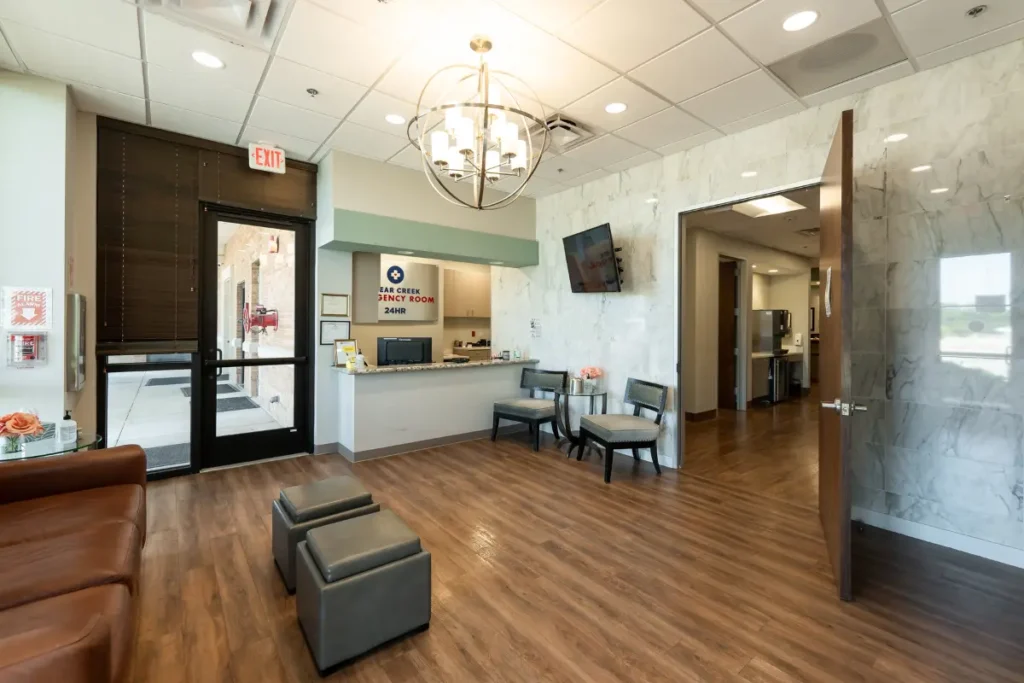Emergency Room for Concussion Treatment in Houston, TX
At Village Emergency Centers, we offer immediate care for concussions, ensuring accurate diagnosis and prompt treatment. Our expert team is ready 24/7 to address head injuries, helping you recover safely and effectively.


Why Choose Us?
Why is Houston Community Choosing Village Emergency Center for Concussion Treatment?
Village Emergency Centers stand out for their commitment to delivering exceptional care in critical moments. Our board-certified physicians, state-of-the-art facilities, and compassionate approach make us the trusted choice for urgent abdominal care in Houston. When every second counts, trust us to prioritize your health and well-being.
What Is a Concussion?
A concussion is a type of traumatic brain injury that occurs when the brain experiences a sudden acceleration and deceleration within the skull, causing it to move or twist. This movement can damage brain cells and disrupt normal brain function, leading to a wide range of symptoms.
Concussions are most commonly caused by a bump, blow, or jolt to the head or body, such as those sustained during contact sports like football or hockey. However, they can also occur from falls, car accidents, and other types of trauma.
Concussion Symptoms
The symptoms of a concussion can vary depending on the severity and location of the injury, but they typically include:
- Headache
- Dizziness or balance problems
- Nausea or vomiting
- Blurred vision
- Sensitivity to light and noise
- Confusion or difficulty concentrating
- Memory loss
- Mood changes, including irritability, anxiety, or depression
- Difficulty sleeping
If you experience any of these symptoms after a head injury, it’s important to seek medical attention right away. In some cases, symptoms can take hours or even days to appear, so it’s crucial to monitor your condition closely.
Signs of a Concussion in a Baby
Babies and young children may not be able to communicate their symptoms as clearly, so parents and caregivers need to watch for signs of a concussion. These can include:
- Changes in eating or sleeping patterns
- Unusual irritability or crying
- Loss of balance or unsteady walking
- Lack of interest in toys or other activities
- Loss of new skills or abilities
Signs of a Concussion in Kids
Children and teenagers may experience similar symptoms to adults, but they may also exhibit other signs, such as:
- Dazed or stunned appearance
- Listlessness or lack of energy
- Difficulty paying attention or following instructions
- Clumsiness or uncoordinated movements
- Slurred speech
What to Do if You Have a Concussion
If you suspect you or someone else has a concussion, it’s important to seek medical attention immediately. A healthcare professional can assess the severity of the injury and determine the best course of treatment.
In some cases, rest and avoiding physical activity may be recommended until symptoms improve. However, more serious cases may require medication or even surgery. It’s crucial to follow your doctor’s instructions and allow yourself time to heal properly.
Concussion Treatment
There is no single treatment for concussions, as each case is unique and requires individualized care. However, some common treatment options include:
- Physical and cognitive rest
- Medications to manage symptoms like pain or nausea
- Physical therapy
- Occupational therapy
- Rehabilitation programs
It’s important to note that returning to sports or other physical activities too soon after a concussion can increase the risk of additional injury and prolong recovery time. It’s essential to follow your doctor’s advice and only resume normal activities when fully cleared to do so.
Long-Term Effects of Concussions
In most cases, people who experience a concussion will fully recover within a few weeks or months with proper treatment and rest. However, repeated concussions or failing to properly treat a concussion can lead to long-term effects, including:
- Memory and concentration problems
- Chronic headaches
- Mood disorders
- Increased risk of future concussions
For athletes in high-impact contact sports, the risk of developing chronic traumatic encephalopathy (CTE) is also a concern. CTE is a degenerative brain disease that can cause symptoms like memory loss, depression, and dementia.
Post Concussion Syndrome
In some cases, symptoms of a concussion may persist for weeks or even months after the initial injury. This is known as post-concussion syndrome (PCS) and can be frustrating and debilitating for those experiencing it. Symptoms of PCS may include:
- Persistent headaches
- Dizziness or vertigo
- Memory problems
- Fatigue
- Irritability or mood swings
- Noise or light sensitivity
There is no specific treatment for PCS, but managing symptoms through rest and medication can help. In most cases, the syndrome will gradually improve over time.
Concussion Recovery Time
The recovery time for a concussion can vary from person to person, and there is no set timeline for healing. In most cases, symptoms will gradually improve over several weeks or months. However, it’s crucial to listen to your body and give yourself the time you need to fully recover.
During this recovery period, it’s essential to take care of both your physical and mental health. This may include getting plenty of rest, avoiding activities that could put you at risk for another concussion, and seeking support from loved ones or a mental health professional if needed.
Visit One of Our Locations Today
If you or someone you know has suffered a head injury and may have a concussion, it is crucial to seek immediate medical attention. At Village Emergency Centers, we prioritize your well-being and recommend taking care of yourself both physically and mentally during the recovery process. Please refrain from returning to sports or high-impact activities without obtaining proper clearance from a doctor. With the appropriate treatment and rest, most individuals can make a full recovery from a concussion and avoid any potential long-term complications.
FAQs About Concussion

What Our Patients are Saying About Our Emergency Care Services
Amy Trim
League City
“This emergency room is absolute AMAZING. Both my husband & I have been treated here & have had phenomenal experiences. They always treat you with love & respect. They run all of the tests that are needed, but they don’t add a bunch of unnecessary test. We all know that doctors are human, but sometimes I think some doctors forget that but not at Clear Creek Emergency Room. Dr. Luna, Dr. Cruz, and Rommel, RN are amazing!”
Keyla H
Clear Creek
“I recently had an experience at the Clear Creek Emergency Room that exceeded my expectations. The staff was incredibly fast and efficient, ensuring that I received the care I needed without unnecessary delays. I was particularly impressed by great bedside manner of Doctor Cruz and highly skilled nurse Rommel who attended to me. I truly appreciate the dedication and efficiency of the entire team. Thank you for providing such exceptional care!”
Isela Luna
Jersey Village
“I was pleased to know there’s a place to get urgent care when needed. I was taken care off promptly and efficiently. Dr. Luna treated me with respect and was very informative about my health condition. I actually was in and out of there in 3 hours. Everything was explained to me and I am happy to know there’s a place like this Jersey Village ER. Hopefully, I will not need to return but if I need to I know I will get great care. Thank you Dr Luna and staff.”
